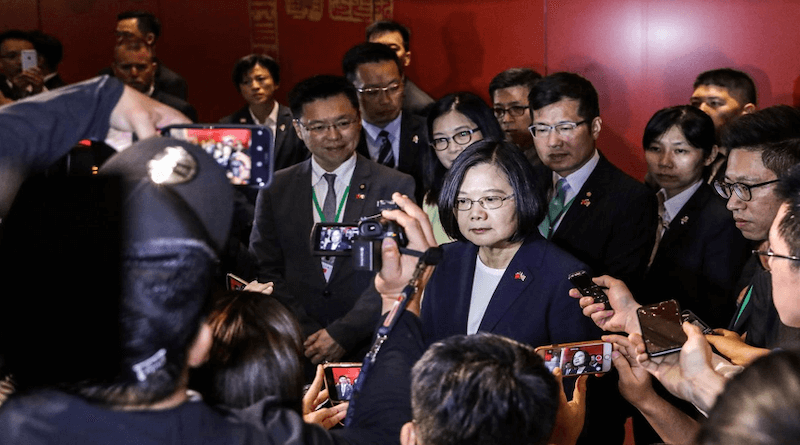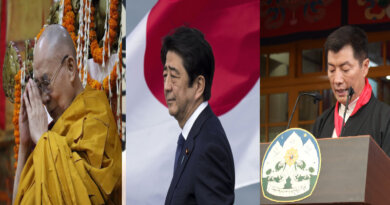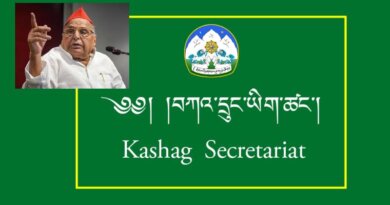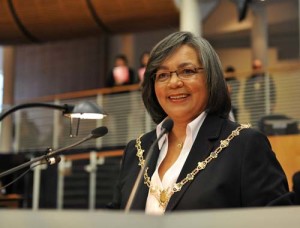Taiwan President visits US again despite Beijing’s objection
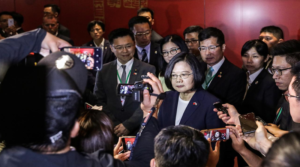
DHARAMSALA, 12 July: Democracy must be defended and Taiwan faces threats from ‘overseas forces’ Taiwanese President Tsai Ing-wen has said in a veiled reference to China as she arrived in the US, reports the Reuters.
“I want to reiterate that Taiwan is not, and will never, be intimidated,” the Taiwanese President Tsai was quoted as saying in the report at a reception in New York for representatives of Taipei’s 17 diplomatic allies which the report said includes almost all small Central American, Caribbean or Pacific nations.
“The challenges we face only serve to strengthen our resolve to engage with the international community. The 23 million people of Taiwan have a right to participate in international affairs and this right should not be subject to political preconditions,” she has said on her arrival in the US despite Chinese objection.
Unlike her last visit to the US in March- a stopover in Hawaii at the end of a Pacific tour, her stops this time will be unusually long, as normally she spends just a night at a time in transit.
Taiwan President Tsai Ing-wen will reportedly spend four nights in the US, two on the first leg and two on the way back from a visit to four Caribbean allies as revealed by Taiwan’s Deputy Foreign Minister Miguel Tsao earlier this month.
She began her trip in New York and is expected to stop in Denver on her way back, the report added.
Beijing considers Taiwan as an errant province had called on the United States not to allow Tsai to transit there on her overseas tour.
Though the US State Department has maintained that there had been no change in the U.S. ‘One-China’ policy, under which Washington officially recognises Beijing and not Taipei, while assisting Taiwan, analysts are of the view that the extended stopovers serves to emphasise the Trump Administration’s support for Tsai at a time when she has been coming under increasing pressure from Beijing, the report said.
According to the report, the US has described Tsai’s visit as ‘private and unofficial’ and added that she would be greeted in New York by James Moriarty, chairman of the American Institute in Taiwan, the de facto U.S. embassy in Taipei.
Before departing the island from Taoyuan, the countries main international airport, she has reportedly said that she would share the values of freedom and transparency with Taiwan’s allies and that she was looking forward to finding more international space for Taiwan.
“Our democracy has not come easily and is now facing threats and infiltration from overseas forces,” Tsai has said, without being specific.
“These challenges are also common challenges faced by democracies all over the world. We will work with countries with similar ideas to ensure the stability of the democratic system,” she concluded.
The report further stated that, shortly before Tsai was due to arrive at her Manhattan hotel, a brawl took place at the hotel’s entrance between dozens of pro-China and pro-Taiwan protesters, which was eventually broken up by police.
While in New York, Tsai will reportedly meet with members of the Taiwanese community.
Meanwhile, earlier this week, the US has approved a potential $2.2bn arms sale to Taiwan, the first in decades amidst escalating US-China trade war.
China, which claims self-ruled and democratic Taiwan as its own and views it as a wayward province has never shied away from using force to bring it under its control.
The ties between the two countries deteriorated under Taiwan’s first female President, Tsai Ing-wen as she refused to accept the Chinese claim over her island nation after her Democratic Progressive Party (DPP) leaning towards independence won the Presidential election in May 2016, after a landslide victory over the Kuomintang (KMT).
While China has used every means including its military might and political influences to isolate Taiwan, she has repeatedly called for international support to defend Taiwan’s democracy and way of life in the face of China’s renewed threats.
Taiwan has been self-governed since 1949 when Chiang Kai-shek’s Kuomintang troops fled to the island after losing China’s civil war to Mao’s Communist Party.

